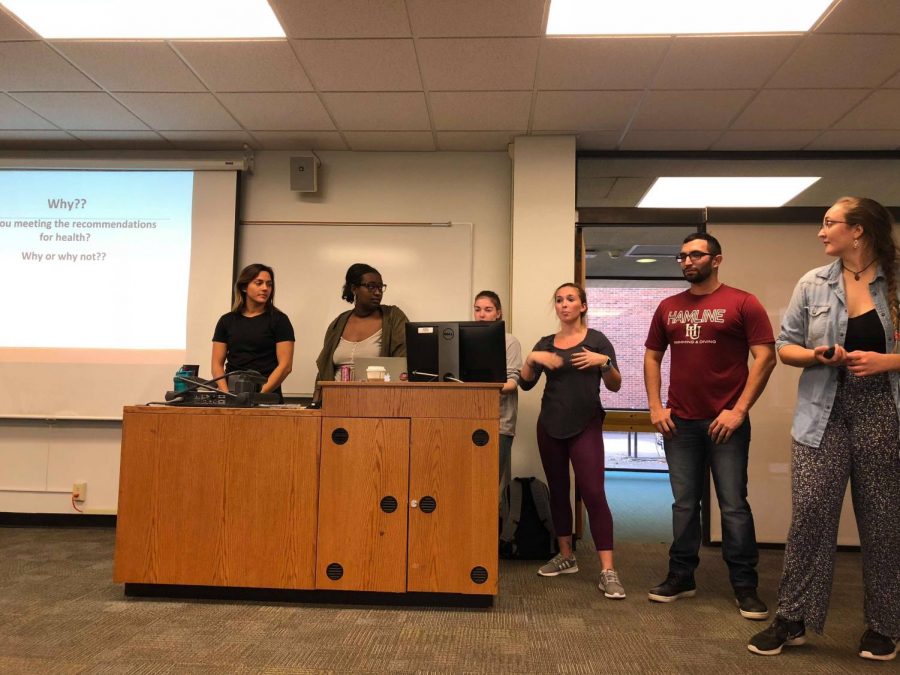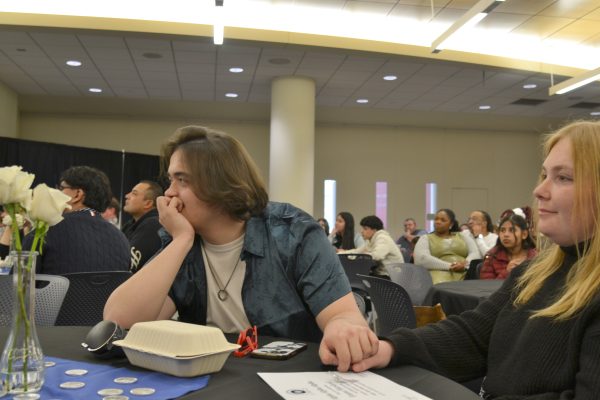Working wellness out
The Wellness Program hosted by the Peer Wellness Educators is an ongoing project meant to improve the overall health and wellness of the Hamline community.
Peer Wellness student educators present in front of other students to educate them about a healthier lifestyle.
October 11, 2018
Last spring the National Health College Assessment was sent out to Hamline students to assess the overall health and wellness of the community. On Wednesday Oct. 4, the third session about physical wellness was held. Its purpose was to further educate Hamline students about easy ways to improve how physically active they are. The results of the survey found that 53.3 percent of Hamline students are not meeting the recommendations for physical activities put forth by the U.S. Surgeon General, CDCP and American College of Sports Medicine.
In her presentation, senior Emilee Daniels and peer wellness educator, talked about the ways to break bad habits, introduce more physical activities into daily life and the many ways that can improve ones health.
“Sitting is really bad for you,” Daniels said. “I’m sure you’ve heard the saying, ‘Sitting is the new smoking’… It can affect sleep patterns and can factor into cognitive decline.”
Daniels continued to explain the negative impacts of sitting and being in a sedentary state that is common amongst college students. From class to hanging out with friends in Anderson, college students spend a great deal of time sitting.
“Being active is the way to fix this,” Daniels said. “We aren’t all bodybuilders, but there are many ways to be active. When hanging with friends go for walks or biking, take the stairs to class or dinner.”
During the presentation senior Becca Heer, an exercise major, lead the students in a short physical activity break where they did jumping jacks, high knees and butt-kicks for certain amounts of time, with rest. This was meant to be an example of how you can take a few minutes and get your heart rate up and keep you from getting drowsy when studying. Continuing the explanation of why being desk-bound can negatively impact students, Daniels discussed the problems with sleep and fatigue found in colleges.
“Nearly 50 percent of Hamline students report fatigue throughout the day,” Daniels said. “Physical activity can help you stay awake and boost your energy a lot. Obviously it can help maintain health in bones and muscles, but the coolest factor is the way it improves sleep. Some ways you may not know it [but] helps with depression and anxiety (some of the most reported issues Hamline students deal with).”
Daniels discussed research that was the foundation for the project conducted by students this summer. Senior Jacob Perez, an exercise science major, worked on this project with faculty advisor Dr. Jen Robbs and is now a Peer Wellness Educator.
“I did summer research this summer… we used the information from the survey we took last semester,” Perez said. “With that information we built the research project, and by working with Peer Education we designed this program… to teach students about different aspects in healthy living.”
Daniels presented a slideshow explaining all the resources found on campus for students to improve their physical health, including intramurals and clubs; however physical health is not the only focus of the wellness educators program.
“We have six programs about every two weeks. [The students] get assignments and we review with that,” Perez said.
The Wellness Programs, in varying amounts, are required by four FYSEMs and all introduction to biology courses but are being offered as an extra credit opportunity for a lot of physical science courses. They are for credit and students must fill out assignments to ensure they receive the points.
First-year Evan Nelsen, whose FYSEM focuses on the Wall Street Journal, has attended two of his four required wellness programs.
“I got to this one… because it was the only time that kind of worked in my schedule,” Nelsen said. “I have to skip meetings… they just need to have more available times. The last one I went to… was about stress and it was very stressful.”
For more fitness and health information go to hamline.edu/wellness to become more active.






